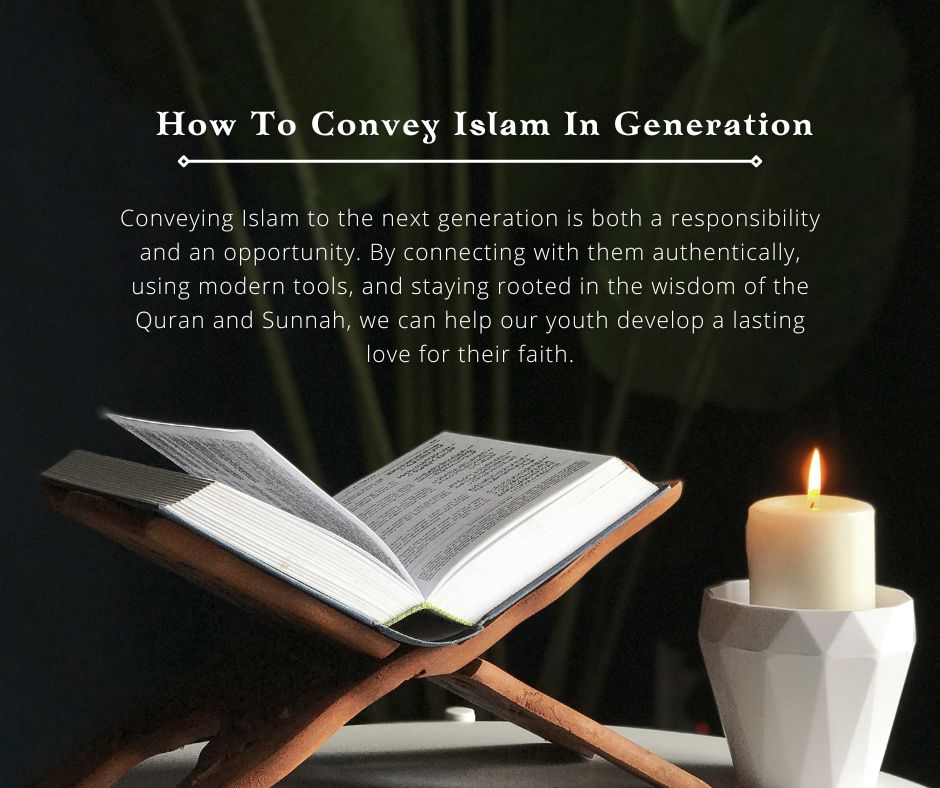How to Convey Islam in This Generation and Guide Them to Follow Islam and the Quran
In an age dominated by technology, fast-paced lifestyles, and ever-changing social values, effectively conveying the teachings of Islam to the younger generation can feel challenging. However, it is not only possible—it is necessary. To help the youth connect with Islam and the Quran, we must speak their language, understand their struggles, and present Islam as the timeless, compassionate, and complete way of life that it truly is.
Understand the World They Live In
Before we can teach Islam to this generation, we need to understand the world they live in. Today’s youth are exposed to information at lightning speed. They face peer pressure, digital distractions, and social expectations that often contradict Islamic values. Instead of dismissing their concerns, we must listen actively and empathetically.
Creating a safe space where young Muslims can ask questions without judgment is the first step toward guiding them to the truth.
Use Technology to Your Advantage
This generation is digitally native—they learn, communicate, and socialize through their phones and screens. So why not bring Islam to them through those same platforms?
YouTube channels, Islamic podcasts, short-form videos on TikTok or Instagram, and interactive Quran apps can make learning engaging. Encourage following reliable Islamic scholars online and subscribing to platforms that share authentic content based on the Quran and Sunnah.
When used wisely, technology can be a bridge, not a barrier, to faith.
Teach by Example, Not Just Words
The Prophet Muhammad (peace be upon him) was known for his excellent character. His kindness, patience, honesty, and humility drew people to Islam. If we want the youth to embrace Islam, we must embody its teachings ourselves.
Whether as parents, teachers, or community leaders, our behavior speaks louder than lectures. When young people see Islam in action—through compassion, justice, and sincerity—they’re more likely to follow it.
Make Islam Practical and Relevant
Too often, Islam is taught as a set of rules rather than a way of life. The youth want to know:
How does Islam help me with anxiety?
What does the Quran say about gender equality, social justice, or purpose in life?
Show them how the Quran addresses real-life issues. Highlight verses and Hadiths that speak to their everyday struggles. Help them see that Islam isn’t outdated; it’s deeply relevant to every challenge they face.
Encourage Quran Connection Early On
The Quran is not just a book to be recited—it’s a guide for life. Start by introducing short Surahs with clear meanings. Discuss stories from the Quran and draw lessons they can relate to.
Use Quran study circles (Halaqas), online Tafsir sessions, and even journaling prompts that help them reflect on Allah’s words. When the Quran becomes personal, it becomes powerful.
Build a Strong Muslim Community
It’s difficult to stay firm in faith without support. Surrounding the youth with a strong, positive Muslim community makes a big difference. Youth groups, Islamic camps, mosque activities, and peer mentorship can create a sense of belonging.
Islam is not meant to be practiced in isolation. When young people have friends and mentors who remind them of Allah, they are more likely to grow spiritually.
Be Patient and Consistent
Guidance doesn’t happen overnight. The journey to strong faith takes time, and every person has their own path. Avoid being harsh or overly critical. Instead, be a gentle guide. Make dua for them. Be consistent in your efforts, and trust that the seeds you plant today will grow, inshaAllah.
Conclusion
Conveying Islam to the next generation is both a responsibility and an opportunity. By connecting with them authentically, using modern tools, and staying rooted in the wisdom of the Quran and Sunnah, we can help our youth develop a lasting love for their faith.
The key lies in understanding, engaging, and inspiring—because when Islam is taught with wisdom and love, it transforms hearts for life.
- Info@salihaonlineacademy.com
- Chaman Zar Colony, Rawalpindi
- Sunrise At: 5:15 AM
- Sunset At: 4:50 PM
- Let’s Talk +923301790195


Leave A Comment